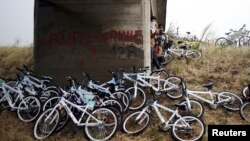Macedonia changed its asylum law on Thursday to let migrants entering the country illegally avoid jail if they leave within three days.
The move follows a series of fatal accidents involving migrants traveling through Macedonia on the way to more prosperous European countries, following dangerous routes to avoid police arrest.
Macedonia has become a major transit route for thousands of Middle Eastern and African refugees and migrants who cross over from Greece and then continue into Serbia. At least 25 have been killed by trains since January as they walked on railway tracks. Many others are robbed by criminal gangs.
The new law approved in parliament on Thursday will come into effect in eight days, and follows pressure from human rights groups. It allows migrants to apply for temporary asylum at the border or the nearest police station. That will allow them to travel legally through the country for three days.
Interior Minister Mitko Cavkov told lawmakers that the number of migrants has tripled since last year — with 2,000 to 3,000 people trying to enter every day — and criticized neighboring Greece for letting thousands flow clandestinely across the border. Greece is a major destination for refugees and migrants entering Europe, most of whom cross, in turn, from neighboring Turkey.
Macedonia's ombudsman recently criticized the government over its treatment of migrants, saying they are being held beyond a 30-day legal limit in "degrading and inhumane' conditions. Ixhet Memeti made the comments after visiting a detention center in the capital, Skopje, where more than 500 migrants, including 35 children, were living in squalid conditions, poorly fed, with many sleeping on the floor.
Human rights activist Suad Misini told The Associated Press that the new law didn't go far enough.
"The change in the law offers only a partial solution to the problem," he said, urging authorities to release migrants from the Skopje detention center.




